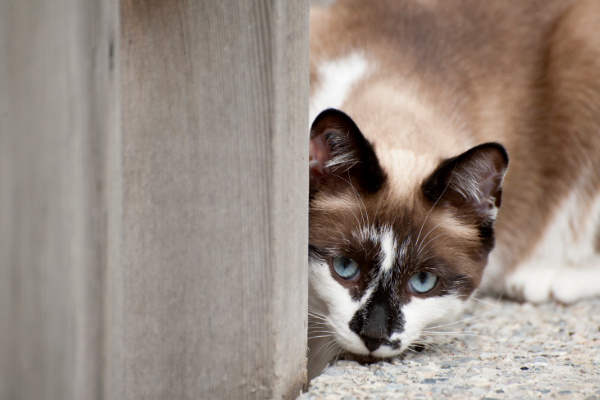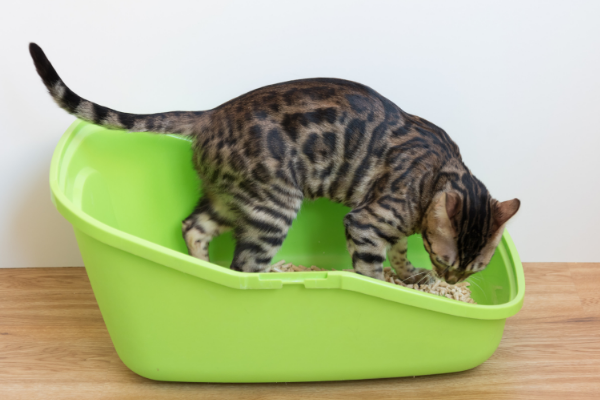One of the most challenging things feline owners have to deal with is their cat peeing everywhere in the house… except inside their litter box. If this has ever happened to you, don’t fret! There’s hope for your cat (and your home!). But first, you need to discover all the possible reasons why your cat is avoiding her litter box. Once you’ve determined the problem, you can take the appropriate course of action and prevent it from happening again.
Be advised that cats who pee in various places do not necessarily do it on purpose. (Therefore, there is no need to scold her and label her a bad kitty… yet.) There may be an underlying medical problem or behavioural issue that needs to be addressed.
Here are the most common reasons your cat is peeing everywhere along with what you can do about it:
1 Your cat has a health-related problem.
Cats who suddenly start peeing everywhere may be suffering from urinary tract infection (UTI) or diabetes. Senior cats with dementia or kidney disease may also be unable to hold it in until they reach their litter box.
When your cat’s peeing habits change out of the blue, schedule a visit to the veterinarian so she can conduct a physical exam and possibly run blood tests and a urinalysis. This will help determine if your cat has a sickness that needs attending to.

2 Your cat is feeling stressed.
Cats are creatures of habit, and the smallest change can give them anxiety. Peeing is your cat’s way of regaining control, especially if she feels she needs to mark her territory when a new pet comes home.
Find ways to introduce new changes gradually, such as familiarising her with your newborn’s items before the baby arrives, or slowly moving out her stuff in the part of the house to be renovated. It might take weeks (or even months) for her to adjust, but your cat will surely appreciate the effort.
3 Your cat dislikes peeing inside her litter box.
From the stinky smell to poop clumps everywhere, a dirty litter box will turn off the most fastidious cat. PetMD recommends cat owners “scoop the litter every day—or multiple times a day if you have multiple cats in your home.” Remember that what smells fresh to humans might not smell great to your cat, so make it a point to do a deep clean every week. This involves emptying and cleaning the litter box completely, as well as placing fresh litter.

Aside from keeping her litter box clean, you need to make sure that the box size and litter you use appeals to her. The box should be large enough for your cat to be able to pee or poop in without feeling crowded. With regards to the litter you pick, Dr. Cathy Lund of City Kitty shares, “Kittens learn what type of litter they prefer from their mothers at about three weeks old. So using a different litter than the one that was used when your cat was a kitten, or deciding to switch the type of litter your cat is used to, could be at the root of litter problems.”
If you really want to switch litter types, test different brands and observe how your cat reacts to them. You might even want to try mixing litters to find the perfect texture combination for your cat. Also, be wary of using scented litter with strong odours that might drive your cat away.
Senior cats or those suffering from joint problems could also have an issue going inside their litter box. Be sure to check if she can step in and out of the box with ease. If she shows difficulty in using it, replace the box with lower walls or one with a low entrance.
4 Your cat’s litter box is in the wrong location.
Aside from finding the ideal box size and content, your cat’s litter box should be placed in a quiet space that’s easy for her to access throughout the day. Placing her litter box in the attic when she spends most of her waking hours in the basement might make her too lazy to go up. Instead, she’ll find alternate areas to do her business!
It’s best to put her litter box in an area where she can do her business without being disturbed by noisy machinery, other animals, and small children.
5 Your cat needs her own litter box.
A home with multiple cats should provide enough litter boxes for their pets. Some cats refrain from using a particular litter box because another cat’s smell is stamped all over it. Meanwhile, other cats choose to use different boxes for different purposes. If you have more than one cat, purchase one litter box for each cat and add an extra one.
How to stop your cat from peeing everywhere
Follow the tips above depending on the likely cause of your cat’s peeing behaviour. When you catch your cat peeing in unsuitable places, make sure to thoroughly clean these spots to prevent future accidents from happening. You can also apply urine odor eliminators or cleaners that destroy the enzymes found in your cat’s pee.
In conclusion
Cat peeing in inappropriate areas should be dealt with immediately, or your pet will think this is acceptable behaviour. Pinpoint the root of the problem, and deal with your cat with patience and understanding. Speak with your veterinarian about it, or if needed, schedule an appointment with a cat behaviour specialist to correct her actions.
Confused about what to do with a newly adopted cat? We share guides on how to introduce a kitten to a cat or a cat to a dog, how to remove fleas on your cat, and how to stop a cat from biting you.


Leave a comment
Your email address will not be published. All fields are required.